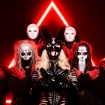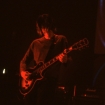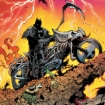Revolver has two exclusive, limited-edition vinyl variants of the Dark Nights: Death Metal Soundtrack — order yours before they're gone!
The Batman Who Laughs would be right at home in a Slayer gatefold. He towers over the DC cast in a black shocktrooper suit and a grisly spiked coronet fitted for his forehead. A tangle of rusty chains are wrapped around his wrist, which pair nicely with the jagged, yellowed teeth that seem to take up most of his face. His origin story is pure comic books but also extremely metal: In one of the remote corners of the multiverse, the Joker went on a killing spree, dispatching everyone in Batman's storied rogues' gallery with brutal, troubling, truce-breaking efficiency. Bruce Wayne finally snapped and broke the clown's neck once and for all. It was all part of the plan, of course. The Joker triggered a toxin in Batman's heart with his dying breath, which gave the world its ultimate doomsday scenario — Bruce Wayne, corrupted by the same amalgam of psychosis that plunged the former Arthur Fleck into darkness. Voila, The Batman Who Laughs, and the star of the show in DC's crossover miniseries Dark Nights: Death Metal.
"When we were doing Batman, I always loved the idea of doing a Joker that was darker than the Joker. The Joker is always trying to prove Batman wrong, that nothing means anything, and to think it does is a joke," says Scott Snyder, DC's longtime Batman writer, who helmed Dark Nights: Death Metal alongside artist Greg Capullo, a diehard metalhead who even created a cover of Revolver magazine, featuring Slayer's Kerry King fighting Slipknot's Corey Taylor, in 2012. "[The Batman Who Laughs] is the perfect character for Metal, because, on the surface, the series is about what comics can be in a good way — in their ridiculousness, fun, and passion," Snyder continues. "Having someone who represents the opposite, how incredibly evil and nihilistic villains can be, felt right."

Dark Nights: Death Metal is a sequel to 2017's Dark Nights: Metal, in which Bruce Wayne discovers the disorienting "Dark Multiverse" hiding out in the cosmology's primordial soup. The lore says that the Dark Multiverse is composed of every fear, doubt and sin lingering within the minds of the DC cast, and that allowed Capullo and Snyder to filter some of the oldest and most sacred superheroes in American history through the prism of badass heavy-metal outlandishness. What if, for instance, Batman rode a chopper plated with alabaster dragon bones and brandished a cartoonishly large grim-reaper scythe? What if Wonder Woman ditched the lasso for a neon chainsaw? What if Superman grew his hair out and opted for moon boots and tight leather pants, like a supercharged, omnipotent version of Vince Neil? It's a celebration of heavy metal in its purest form: thrilling, profane, over the top. Fittingly, then, there are Dark Nights: Death Metal – Band Edition variants of the comic featuring illustrated incarnations of Ozzy Osbourne, Ghost, Megadeth and more. There's also a soundtrack album jampacked with original contributions from artists at the cutting edge of heavy music.
"We wanted to remind people how meaningful comics can be, while still being completely ridiculous," Snyder says of the series. "There's a spirit of that in metal. It's something that drives you, that gets you pumped."
The DC narratives have skewed serious and meditative in recent years. In fact, Capullo and Snyder are both responsible for some of the most thoughtful Batman stories in modern history. Together they've tackled knotty issues like family strife, police brutality and the mental toll that the cowl takes on Bruce Wayne beautifully. But now, both of them are offered a chance to cut loose and create the sort of pulpy, throwback, outrageously metal superhero saga they always had in them.
"When you're a little kid reading comic books, the crazy visuals are what draw you in. Now that I'm older, I like the character arcs and such, but that core never leaves you," says Capullo. "The more wild and crazy stuff you can pro-duce, it feels like being a little kid again. Except now, it's born out of my pencil."
"It's been a real joy to say, 'How can we dial this lunacy up to 11?'" Snyder adds with obvious glee.
One of the fastest ways to up the intensity of an artistic venture is to bring in Tyler Bates, who has lent his muscular compositional instincts to everything from Guardians of the Galaxy to John Wick. He also knows everyone. Few people in the industry can boast collaborations with Rob Zombie and Zack Snyder. So, when DC decided to create a soundtrack album to pair with Dark Nights: Death Metal, Bates was the ideal curator. It was an opportunity to recruit some of his favorite artists across the grand spectrum of heaviness, but perhaps more importantly, a chance to offer some invigorating work to musicians sidelined by the pandemic. At a moment where there were no festivals, no tours, and a whole lot of postponed albums, at the very least, you could count on a phone call from Tyler Bates to do something fun.
"It was about songs inspired by this comic series and engaging artists who were into comics," he says of executive-producing the soundtrack. "As COVID was unfolding, I thought it was a great way to initiate some camaraderie in some artists who are frustrated and hurting. A chance to step out of their normal mind state. We've been collaborating the whole way."
The album that emerged is 15-tracks long and features 20 artists. The contributors list is impressive. Mastodon unleash a rager that directly name-drops Dark Nights: Death Metal's green-eyed demon lord Neron, whose "sick mullet was the main inspiration for the song," jokes drummer Brann Dailor. Punk-rock institution Rise Against offer "Broken Dreams Inc.," which served as the lead single for the entire project. Buzzy up-and-comers, like banjo-wielding New York hardcore trio Show Me the Body and glammed-out confrontationalists Starcrawler, are strongly represented. But Bates was also happy to delve deep into his rolodex and dredge up some all-timers.
One of the cuts that the producer recalls most fondly is his own collaboration with Los Angeles electronic-rock veterans HEALTH. They have the third track on the album, the otherworldly "ANTI-LIFE," and Bates reached out to old friend and Deftones frontman Chino Moreno — who also happens to be HEALTH's "favorite singer," according to the producer — to put an exclamation point on the song. For the band's Jake Duzsik, it was a long-simmering dream come true. "We didn't really think that was a possibility, so we were shocked when it actually ended up working out," he enthuses.
Bates made another fantasy a reality with the upstart British synthwave band GUNSHIP. This time, he rang up Dave Lombardo, the revered drummer who gave Slayer their incredible thunder over the course of four decades. A short time later, Lombardo was detonating his kit underneath another newly minted collaboration, the aptly titled "Berserker." "That's such a weird connection that I don't think they would've been able to make," Bates notes.
All of this is proof that Dark Nights is not your average promotional record. Through the COVID doldrums, says Bates, nobody was emptying the back catalog or dusting off some musty, deleted takes. Instead, everyone treated this project as sacred ground. Or, in Snyder's parlance, the artists involved all dialed it up to 11.
"It was a fun way to be musical, to be creative, to have a chance to step outside of themselves," says Bates. "As a result, I think we made a really powerful record. It was made at a time where everyone was in survival mode, and everyone engaged in it solely for creative participation."
It also didn't hurt that the project was for DC. After all, it's not every day you're recruited to help soundtrack what remains the most iconic superhero collective on the planet. As Dailor tells us, "Everyone in Mastodon collected comics as kids and some of us got into graphic novels later and especially the expanded DC Batman universe. To be asked to contribute a song and become part of that universe is a huge thrill for all of us."
Denzel Curry, the album's lone hip-hop representative, felt the same. According to Bates, the Florida fire-breather has an "encyclopedic" DC knowledge. "He knows everything, everything," he emphasizes. Being such a diehard fan, Curry didn't want to miss.
The rapper carried that attitude to the Dark Nights: Death Metal: Sonic Metalverse, a series of animated shorts based on the comic's story arc. The cast is made up of Hollywood celebrities (David Hasselhoff), comic book royalty (Greg Capullo takes a turn) and many of the artists that appear on the soundtrack. Curry plays Darkseid Batman, a fusion of the Caped Crusader and perhaps the single most notorious villain in the fiction. It's a dream assignment for any DC disciple, and unsurprisingly, Curry revs up his performance as if he was 12 bars deep in the studio. "Denzel was the one who put the most pressure on himself, because he was so reverent," says Bates.
For the producer, getting his friends and colleagues to appear on the record was fairly straightforward, but he was also responsible for convincing those same artists to provide a voice for the characters in the Sonic Metalverse. The stakes are high, and you can understand why some of them were hesitant. Perhaps the most unlikely casting was Chelsea Wolfe, who has made her name creating profoundly haunting goth rock, music that hardly suggests the character she ended up voicing: none other than Wonder Woman, the DC universe's singular paragon of justice, love and the inherent goodness of mankind. Needless to say, Wolfe had reservations — but they might not be what you'd expect.
"I warned [Tyler] that my speaking voice is quite monotone!" she remembers of the moment when the producer proposed the role to her. "My close friends know that even if I'm excited about something, it sounds as if I'm just as stoic as ever."
But Bates thought it could work. "She was like, 'I don't know, would I be right for that?' And I said, 'You're Wonder Woman when everything has gone wrong in the world.' You don't have to be all rah-rah,'" he recalls.
"I gave Wonder Woman a more introspective, thoughtful energy than some-one else might," says Wolfe, who also channeled the character with her contribution to the soundtrack, the grinding, industrialized standout "Diana." "But thankfully, everyone involved with the comic seemed to dig it, so I kept going."
This kind of paradox carries through the whole spirit of the project. In the same way that Wolfe doesn't fit the archetypical image of Wonder Woman, her artistry certainly doesn't fit the archetypical definition of, well, death metal. For a comic book series that aims to pay homage to the awesome excessiveness of headbanger subculture, Bates and the rest of the DC team seem eager to expand and innovate on the outmoded definition of "heaviness." Yes, this is a record punctuated by metal mainstays like Mastodon, Moreno and former Dillinger Escape Plan frontman Greg Puciato. But you'll also find jagged indie rockers Soccer Mommy and Brighton post-punk crew IDLES.
"I think heaviness is substance, and soul, and honesty," Bates says. "You can argue that Steely Dan is heavy. You're talking about incredible composers with awesome taste. It's all about the intent of what a performance is. When I find that people are just repeating themselves, I become uninterested. I've toured a bunch over the last decade, there are a lot of allegedly heavy bands out there, but they're not heavy, they're lame. They're retreading and rehashing ideas. I'm down with artists that are constantly challenging themselves."
Greg Capullo echoes this sentiment. He's talking about music, but it's hard not to see parallels in Dark Nights: Death Metal, the series — two comic book titans risking a wild, outrageous run that's very much removed from the Batman stories that they've built their reputations on. Everyone involved in this project wants to push the envelope, and there's nothing heavier than that.
"You can't keep writing the same song over and over again," says Capullo. "Unless you're AC/DC."












